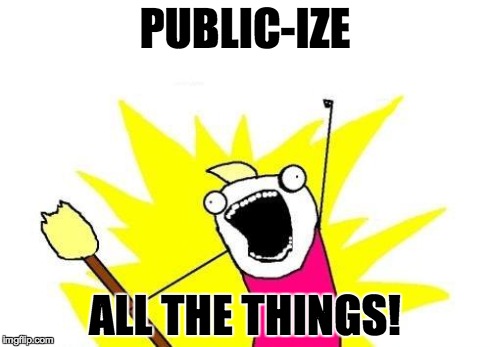On facebook, my friends list is private, but [almost] everything i post is public. My reasoning is this: ultimately everything we post online is preserved indefinitely and will exist until the end of time. So why not? Whether or not we “share” it with our friends, someone will have a copy of that data because of online surveillance at least. It’s moreso philosophical reasoning and obviously it’s impossible to preserve 100% of the information people post online.
I’ve even gone back and retroactively publicized my Facebook posts. I haven’t finished yet and I deleted my 2007-2011 FB account, which overlapped with the one I’m currently using. I did this out of fear of surveillence that was getting worse. Deleted, not deactivated. Yes, that is possible. I found the hidden deletion link via a Gawker story actually. Here’s a more recent article with more social account deletion options. Now I regret deleting it because it’s made it much harder for me to say “See? I called it in 2007! The NSA really is datamining ALL the things! Who’s crazy now?” followed by throwing my tin-foil hat at the haters.

“I like you man … You’re crazy, but I like you.”
So that’s mostly why. Oh and also: I post a ton of content that could be considered “fringe” or unsupported by a plurality of evidence — even though most of it turns out to be true at a later date =D I’ve had a few people tell me in person, “You post crazy stuff online, man.” with a worried look on their face. One person told me in 2014 that “Dude you post crazy stuff. The government can’t really listen into all your phone calls.” I was confused. I’m pretty sure this guy was comatose for all of summer 2013 when Snowden offically broke the news. Either that or he’s unaware of the capacity of algorithms to recognize patterns that humans can’t. No, government agents are not individually reviewing all your data. They don’t have to! The prospect of a surveillance state that lacks human involvement at most levels is very worrying!
Maths is real hardlike.
And perhaps more worrisome, the average person lacks the capacity or volition to even begin to comprehend the math required to understand computers’ capacity for recognizing patterns in data. Well, let me make it clear – don’t worry, I’ll simplify this in just a second – with enough data points in the right dimensions, with the right machine learning algorithms, with enough networking throughput and with enough computational capacity – computers can recognize any pattern and solve any problem. Even patterns in data that cannot possibly be recognized by humans. Even data you did not consciously intend to create.
Even patterns that don’t actually make sense or aren’t valid. Computers get things wrong too, but what if these invalid findings are used to significantly impact your life.
1+1 = wut?
I kid, I kid. Don’t feel bad. I’d say less than one percent of people understand the math for this stuff. So, let me simplify the paragraph above: computers can recognize and completely solve for any pattern. And you’re not going to really understand the math unless you took master’s level math classes. Don’t understand why algebra and geometry are important to learn in high school? Don’t understand why these subjects are relevant to your life? They’re not – except to establish the prerequisites required to understand the math that is significantly relevant in your life – set theory, category theory and more.
And this may just be typical David Conner hypothetical philosophizations completely lacking evidence. However, I postulate that learning such maths as set theory and category theory actually establish new forms of circuits in your brain that enable totally new, more complete and generalized means of understanding the world around you, but at a subconsious level. And therefore, the psychology of college-educated and math-aware individuals may differ significantly in their propensity for cognition. In other words, smart mathy people subconsiously understand problems in a more generalized manner, enabling construction of mental models that promote more complete, efficient solutions to problems in their life. I’m not talking about the ability to solve math problems faster. If you understood enough math, you would understand that everything can be reduced to a mathematic model, but this topic needs its own article.
Back to the topic at hand …
Life is better with more communication
Life is easier when people talk about their problems. You say it’s crazy to share something like that? Something about a personal problem? People learn from those around them. There are many problems I can imagine people being deathly fearful of sharing. But what if that means that someone else doesn’t have to go through that? What if it means that you can prevent something like that from happening? What if you believe you really can change things?

These people who’ve called me crazy were nice enough to say something to my face. What about all the people who didn’t? When my profile was private and everything was locked down, there were people who may have used this against me. If someone told other people I posted “crazy stuff” online and mentioned that I was in favor of marijuana legalization and other misunderstood topics, these people would be unable to verify it for themselves. They wouldn’t be able to see what I posted, read my reasoning and understand why I believe what I do. (The previous sentence has possible Oxford Comma abuse - lulz)
And so, in effect, I wouldn’t be able to defend myself because most people won’t verify this with you in person. However, if everything is public, then they can see for themselves why I am not radical, why I am not off the rails, et cetera. At least it’s there in front of their face. It becomes harder for others to misrepresent me by simply labelling me with my beliefs, since others who haven’t met me can much more easily verify it for themselves.
I’m very straightforward, honest, ethical, mindful and loyal.
I practice these almost to a fault. I’m willing to state my beliefs and, if necessary, suffer for them because I truly believe they are causes worth bleeding for. In the 30’s and 40’s, you’d probably find a lot of people adamantly against ending segregation and you’d also find homosexuals who were very afraid of coming out. In 1950’s Britain, homosexuals were chemically castrated. This fear cultivates a society that is afraid to speak out. Only by standing up and spreading light can you begin to cease injustices, but doing so isn’t easy. It’s not easy to change established cultural norms, especially when there exist people who have vested interest in perpetuating them. They will fuck with your life, they will not fight fair and they will pursue strategies that will prevent you from becoming aware of the need to defend yourself.
Haven’t read Sun Tzu’s Art of War?
Haven’t read The 48 Laws of Power? You should. No, not to utilize these manipulative strategies yourself, but instead to innoculate yourself against them. In totalitarian societies, you will find these amoral behaviors everywhere. Shouldn’t we be learning to fight them?

Surveillance cultivates it’s own air of fear and this is dangerous, because it limits our ability to change. Everything that is “wrong” will be totally enforced and you will be unable to resist. One all powerful entity will posess the capacity for evil, for lies, for manipulation. Anything that opposes it will be ruthlessly destroyed. You will not be able to lie to the state to protect yourself.
This is sinister and dangerous to our society, too. Stagnation is death. And stagnation leads to homogeny, which is another predictor of a waning society. Perhaps, I’ll write an article to explore this in depth.
I’m an advocate of privacy, but why should I hide?
Obviously, this reasoning isn’t great and can put some people at a disadvantage. Maybe you’re in the Witness Protection Program. Perhaps you’ve been in bad relationship. Maybe you’ve justly stood up against someone who you fear may dispense retribution. Maybe you just enjoy a simple, private life and don’t see the need for everyone to know about it. Maybe you can’t say what you want because of where you work. Maybe you’re really afraid of NSA surveillance, which is ironic – because their algorithms can identify people who are trying to hide themselves online and these are EXACTLY the kind of people who they will want to focus further surveillenace efforts on.
However, in contrast to what I’ve written so far, one thing that worries me is kids posting things online before they are old enough to realize the significance and cost of doing so. They might permanently mark themselves in a way that can’t erased without understanding what they are doing. This is a worrying topic and perhaps a weapon of rhetoric in the fight against total surveillance.
“It’s not publc, therefore it’s not seen?” WRONG!
I truly act with the belief that everything we do online will persist for æternity. While not totally factually accurate, this is the presumption under which I am operating because, given enough time, it will become true. That is an inevitability. Currently, web applications and bots are scraping public-facing websites for data. This means that anything public is archived and persisted in systems such as The Wayback Machine. That means you’re now talking to people from the future. From the fuuturreeee, maaannn…. and the more copies of your content that exist, the less likely it is that they can be altered or erased. It’s like compu-archaeology, maaannn…. </headyhippyvoice>
However, just because it’s not public doesn’t mean it can’t be scraped. The NSA can hack your account and scrape all your posts. Or maybe they just hack your friends account and scrape the accessible content. Or maybe it’s not the sinister NSA, maybe your local police station just employs virtual informants, who authorize an automated bot to scrape the profiles of their friends. Kind of like a Facebook app that rats out all your friends. Not possible? Not probable? Paranoid? GET. FUCKING. REAL!
With technology, if it’s possible, it’s inevitable!
We deserve to be far more aware of the capabilities. We need to. For without it, we will be caught unaware as a totalitarian adversary assumes control of the system we have created. The fewer people who have control or knowledge of this system, the more likely it is for an adversary to subvert it for their own agenda.
Snowden wore a snuggie when he opened sensitive files.
To cover his face and prevent his computer’s webcam from comprimising him.
But maybe you’re not Snowden. That’s an reasonable counterargument. Maybe you’re not worried about government surveillance. That’s not unreasonable. At the moment, there’s probably not too many people who have their affected by it. I know I don’t have anything to worry about.

With great snuggie comes great warmability.
How about this? You lose your job because someone at work uses the net to find ways to bully you at work. Your relationship is ruined because your significant other snoops through years of messages and misinterprets old words and actions. Or maybe a jealous frenemy wants to discover information to use against you.
If everything is ultimately, inevitably public – that is, if all private online content can be discovered and in the end will become public – then maybe you shouldn’t digitize some content/thoughts in any way. You should write your blog cowering in the corner of your room, like in 1984.
You should assume that private content is already public.
Because, when considered from my more philosophical perspective, it will eventually be public no matter what it is. Private journal on your laptop? Easy to scan for – look for recent files. “Only Me” facebook posts? Easy to find. Private messages? Back before HTTPS and security was cool (< 2010), these were extremely to comprimise. Or maybe you just left yourself logged into your laptop and a nosy friend started browsing. Or maybe Facebook didn’t get comprimised, but your “friend” sent you clickbait with an exploit on the page. And now they can remotely view everything you can see. Maybe they don’t activate your webcam because they’re not creepy. They’re just conniving and want to “win” regardless of the cost.
Now come on – that just doesn’t happen.
I guess you haven’t heard of the despicable practice of RAT’ing. Remote Administration Tool. Read this great Ars Technica article on it. Apparently, there’s a whole bunch of sick kiddies that are into this wierd voyeur stuff. Maybe it was that geeky computer tech who was super friendly and lied to you to have access to your computer installed something on there. Kind of like a skeezy mechanic, the kind that would tug on the right hoses and belts in just the right way to see you again in 3 months.
Believe me, if you are a threat to someone in an extremely competitive situation – and this person is a sociopathic, manipulative freak who doesn’t have rules for right and wrong – you will find that your “private” personal information is made known. It will come up indirectly, though you did not disclose that information. It’s really hard to know, with any certainty, that someone violated your privacy.
That “privacy” button on Facebook? L M A O
Maybe you stayed at a hotel with everyone else at a competition and were unaware the WiFi router was comprimised. You went to your favorite news site - that doesn’t host content with HTTPS – and were unaware that someone injected an exploit into the content on that funny news story you read. Maybe you work at a company that has a legitimate need to spy on their employees. Or maybe you work for a company where an individual feels it should be a standard practice to be intimately aware of your personal life, whether or not it’s ethical. You know, just in case … That laptop they gave you? The one that took a few extra days to arrive? Maybe it has a Rootkit on there. Sometimes, it is impossible to remove those. Reinstalled Windows? OSX? LMAO, please. Maybe you only connected the comprimised computer to your home network. Well, a skilled attacker can remotely comprimse the rest of the devices on that network.

I’m not really paranoid about all this stuff happening to me. Why would anyone want to spy on me? I just like to think out these scenarios to better understand what is possible. After all, if someone hacks you and invades your privacy, there’s not much you can do to stop it. Without the proper tools configured in advance, you don’t have much of a chance to even discover that it happened and even less of a chance to discover who did it.
Some sociopaths are ONLY motivated by their self-interests. Therefore, if they don’t believe there are significant repercussions and there’s sufficient incentive to do it, they will. Some people are slimy invertibrates and these are precisely the people who will shake your hand with a smile after they violated you.
However, this self-centered focus on themselves is actually a fairly big weakness for sociopaths: it becomes much easier to predict their behavior if you know they are always only going to do what is in their own interest. If you can present them with situations with controlled choices where it’s hard for them to see ahead, then you can set them up to burn themselves.
NOW is the time!
Why did I go through such lengths on this post? Because now is our chance to evolve to be capable of living with technology! It is inevitable after all. And I am absolutely not encouranging radical means of doing so. In fact, doing so will likely backfire for what I just mentioned above: someone else with less oversight will gain control of the system. Instead, we need to be far more aware of what is going on. But we absolutely cannot buckle in fear of surveillance. That is absolutely the worst possibility.
Ultimately, everything is public anyway.
When you make all your posts private, you significantly limit your capacity to effect change! And because I want to make people more aware – because I am so passionate about surveillance and other social reforms – THIS is why I will broadcast to the world everything I do and say online. I do not live in such a way that I cannot. One of the wisest things you can attempt to do is to live in the light. Live in such a way that no one would want to harm you. Live so that you can shout your beliefs from the mountaintop. Maybe everyone will ignore you. Maybe some will applaud you. But, if you truly live a proper life, no one will desire to harm you. Or so I hope.
Oh and you know what sucks?
Having your greatest strengths – your intelligence and creativity – used as a justification for being labeled “crazy” and “paranoid” by people who never wanted to understand you anyways.